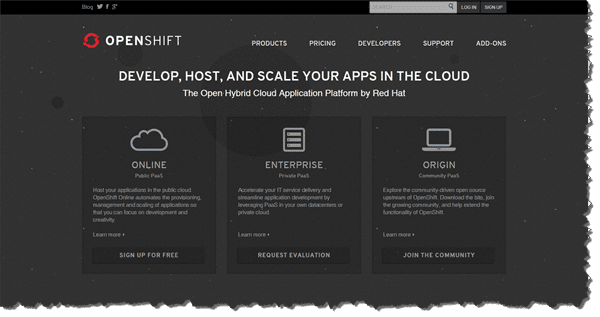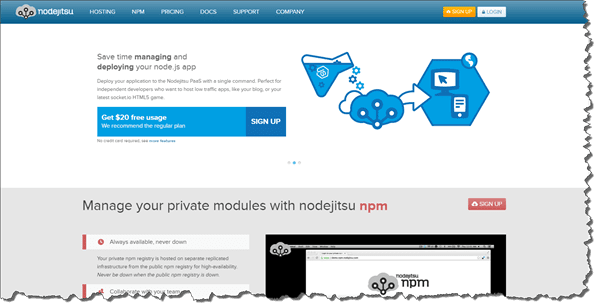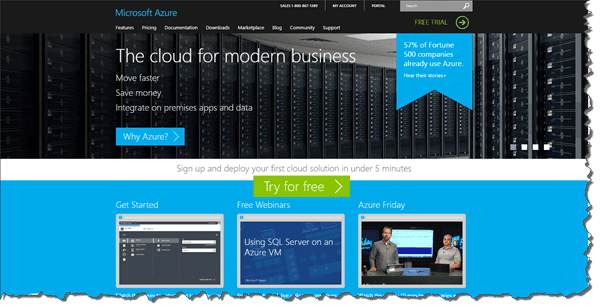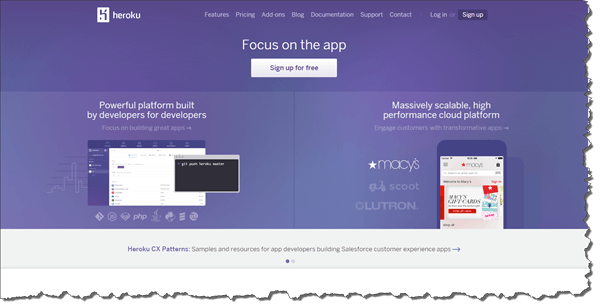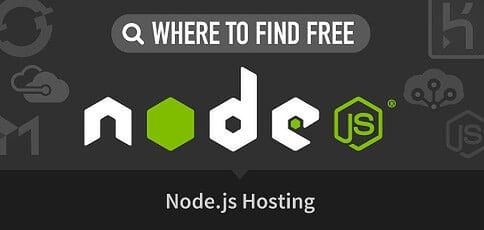
Fans of the developer-friendly JavaScript platform may already know where to find free Node.js hosting — but where do you go as your app needs to grow?
If you’re just starting out, free probably sounds pretty good. Heck, who doesn’t love free? When your site or app’s needs start to scale, however, free plans probably won’t cut it. Given the administrative server access required to install and configure Node.js and its related packages, the run-time environment is typically reserved for more powerful (and more expensive) VPS and dedicated server plans.
The best Node.js hosting plans, however, balance computing power with affordable rates. We’ve evaluated the web’s leading Node.js hosting providers to give you the best options for free and almost-free hosting.
Top 3 “Almost-Free” Node.js Hosts – Best Values
Node.js hosting poses many advantages for JavaScript developers, and, as you might guess, finding a free service that doesn’t sacrifice quality can be tricky and very limiting. We’d recommend instead opting for an affordable, high-powered server host with plans that specialize in, or at least are capable of facilitating, Node hosting. Having tested the top VPS and dedicated server plans on the market, we found the following to be the best and easiest for Node.js:
1. InterServer.net
- $0.01 for the first month using code HOSTINGADV
- Then $6 monthly with no contracts, no changes
- Latest of PHP, MySQL, Perl, Python, and Ruby
- 7 operating system options for Linux or Windows
- Full root access and choice of datacenter
- Get started on InterServer now.
VPS
RATING
★★★★★
Our Review
InterServer's on-site datacenter and hands-on involvement with configuring and provisioning virtual private servers give customers a level of flexibility not seen with many other hosting providers. InterServer rations VPS and cloud resources through slices. Go to full review »
| Setup Time | Disk Space | CPU | RAM |
|---|---|---|---|
| 6 minutes | 30 GB SSD - 480 GB SSD | 1 - 16 CPUs | 2 - 32 GB |
Not only does Interserver feature a $0.01 introductory offer and month-to-month (no annual contract) billing, but it happens to be one of the fastest and most reliable hosts we’ve tested. The hosts offers a simple guide for Node.js setup and an always-available support team in case you need assistance.
2. Hostwinds.com
- Managed or unmanaged, in Windows or Linux
- Cloud hosting with hourly or monthly billing
- Instant upgrades without downtime
- FREE around-the-clock monitoring
- Automatic nightly backups available
- Get started on Hostwinds now.
VPS
RATING
★★★★★
Our Review
Does any hosting provider have more virtual private server packages than Hostwinds. The company offers 10 configurations — and that's just for managed Linux server partitions. Go to full review »
| Setup Time | Disk Space | CPU | RAM |
|---|---|---|---|
| 6 minutes | 30 GB SSD - 750 GB SSD | 1 - 16 cores | 1 - 96 GB |
Hostwinds is one of the fast-growing VPS hosts, offering affordable plans and market-leading features. It too offers easy Node.js installation instructions to ensure you’re up and running in no time. And as your project scales, the Hostwinds will give you instant ugrades with no downtime.
3. A2Hosting.com
- FREE Cloudflare CDN and SSD speed boost
- Optimized caching and 1-click installs
- Unlimited email, domains, and databases
- Advanced security and FREE HackScan
- 24/7 support via phone, chat & tickets
- Get started on A2 Hosting now.
CHEAP
RATING
★★★★★
Our Review
There are plenty of excellent cPanel shared hosting providers out there, so what sets A2 Hosting apart from the rest. Not only does the company offer a ton of features, but it has custom-built its packages for enhanced performance, speed, and security — putting your priorities above pricing. Go to full review »
| Money Back Guarantee | Disk Space | Domain Name | Setup Time |
|---|---|---|---|
| 30 days | 100 GB SSD - Unlimited SSD | New or Transfer | 4 minutes |
A2 Hosting is known for speed and reliability at an affordable price — even on shared hosting plans. Their support section features several Node.js guides to help you through install and launch.
Now that we’ve covered the best Node.js hosting options, let’s take a look at some more limited options. These free services can be a good place to experiment with your newest project, but lack the support, scalability, speed, and security of the paid options.
See more paid VPS options for Node.js »
Top 5 Free Node.js Hosting Services
We’ve scoured the web to find the consensus on the best Node.js hosting with a $0 price tag. Below we break down the feature sets and limitations of the most popular providers.
| Node.js Host | Languages | Limits | Highlight |
|---|---|---|---|
| RedHat OpenShift | Node.js | Java | PHP | Ruby | Python | Perl | Ruby | More | Host 3 applications | Built-in private database; completely free within limits |
| Nodejitsu | Node.js | $20 credit for first month | Amazing support from developers like you over IRC |
| Microsoft Azure | Node.js | Java | PHP | Python | .NET | $200 credit for first month | Provision Windows and Linux Virtual Machines and applications in minutes |
| Modulus | Node.js | $15 credit for first month | Built-in auto-scaling capabilities so your application can scale to demand |
| Heroku | Node.js | Java | PHP | Ruby | Python | Scala | Clojure | 1x CPU Share | Row limit 10K | Technologies you love with more than 100 services in the add-ons marketplace |
If we’ve left out any Node.js hosts you think are worthy of recommendation, let us know!
1. RedHat OpenShift
Go check out RedHat OpenShift, or jump back to the top free Node.js hosts.
From the people who brought you Red Hat Linux and many other popular open-source projects, RedHat OpenShift seems to be the go-to recommendation for free Node.js web hosting.
OpenShift stands out among other free Node.js hosts by offering a no-trial, truly free Node hosting platform; however, the #5 Node.js host, Heroku, also offers a “free forever” plan.
What You Get For Free:
Languages / Frameworks – Node.js | Java | PHP | Ruby | Python | Perl | Ruby | More
Limits – Host 3 applications
Scalability – Automatically scale up or down as your application requires
Geographic Reach – Deploy apps closer to your users with less latency
Support – Backed by Red Hat, the world’s leading provider of open-source solutions
Other Free Features:
- System Administration by Red Hat
- Application Auto-Scaling
- Maximum Gears: 3
- Application Idling: 24 Hours
- Hosting Region: US
- Included Free: 3 Small Gears
- Storage Base (per gear): 1GB
- Subdomains on rhcloud.com
- Shared SSL on rhcloud.com
- Custom Domains
- Sharing Controls
- Help Center
- Documentation & Guides
- Developer Community
Hop over to this article to read more rave reviews of OpenShift and Red Hat.
2. Nodejitsu
Go check out Nodejitsu, or jump back to the top free Node.js hosts.
Another highly recommended free Node hosting provider is Nodejitsu, a large contributor to the Node.js community since 2009. This team knows the tech industry inside and out!
You can get $20-worth of free usage, or, if you’re hosting an open-source project, you can host one project completely free of charge.
What You Get For Free:
Languages / Frameworks – Node.js
Limits – $20 free usage; plans start at $9/month
Support – Amazing support from developers like you over IRC
Infrastructure – Infrastructure for all individual plans on blazing-fast Joyent Smart Machines
Deployment – Single-line deployment with CLI tool (run jitsu deploy); free continuous deployment for public and private repos through GitHub Webhooks and Travis CI
Websocket Support – First platform to support Websockets; Nodejitsu’s open-source node-http-proxy module is used for almost every platform that currently supports Websockets
Custom Domains – Free custom domains available with every plan at dns.nodejitsu.com
Database Management – Easy database provisioning with MongoDB, CouchDB, or Redis
At Nodejitsu, open-source is part of the team identity. The company offers to host open-source apps for free in support of the free software movement. Apply here.
3. Microsoft Azure
Go check out Microsoft Azure, or jump back to the top free Node.js hosts.
Another strong competitor in the free Node.js hosting world is Microsoft’s Azure services. You can sign up for a free month and get $200 to spend on all Azure services.
What You Get For Free:
Languages / Frameworks – Node.js | Java | PHP | Python | .NET
Limits – Receive a $200 credit your first month (depending on total spending)
Infrastructure – Instant provisioning for Windows and Linux VMs and applications
App Development – Build and deploy apps for Android, iOS, and Windows; auto-scaling
Data Insights – Managed SQL and NoSQL data services; cloud-based SQL server and HDInsight to build Hadoop clusters for data analysis
Get started with Azure and easily manage user accounts, synchronize with exisitng on-prem directories, and get single sign-on access on Azure, Office 365, and hundreds of other popular SaaS applications, including Salesforce, DocuSign, Google Apps, Box, and Dropbox.
4. Modulus
Go check out Modulus, or jump back to the top free Node.js hosts.
Yet another great free Node.js hosting service is Modulus. This is a premier Node.js hosting platform that provides a complete technology stack for application developers, including custom SSL, WebSockets, MongoDB, and statistics.
With Modulus, you get a $15 credit to spend in your first 30 days of free service.
What You Get For Free:
Languages / Frameworks – Node.js
Limits – $15 credit the first month
Scalability – Flexible infrastructure; application instances run on mini-servers called Servos, which can be dynamically added or removed on the fly
Auto-Scaling – Built-in auto-scaling based on custom-defined rules (set up individually for each region in which your application is running)
Storage – Unlimited peristent storage directly mounted to the file system and instantly replicated to all application instances
Other Free Features:
- Websockets
- Session Affinity
- Multiple Node.js Versions
- Servo Sizes
- Integrated Mongo Database
- CLI Deployment
- Mobile Management
- Custom Domains
- Free Custom Domain SSL
- Multiple Region Support
- Notifications
- No Tiers
Modulus has a motto of “track everything.” Every request that enters your Node.js application is stored and available in real time. Statistics are broken down by individual routes, so you can see which route is taking the longest to respond, which is transferring the most bandwidth, and which is the most active.
5. Heroku
Go check out Heroku, or jump back to the top free Node.js hosts.
Last but certainly not least, Heroku (her-OH-koo), which was founded in 2007, also boasts a completely free Node.js hosting plan for hobby use.
What You Get For Free:
Languages / Frameworks – Node.js | Java | PHP | Ruby | Python | Scala | Clojure
Limits – 1X 512MB RAM; 1x CPU share; 10K row limit; four hours of downtime per month
Add-Ons – 100s of fully managed services for logging, caching, monitoring, and persistence can be provisioned and scaled in a single command and consumed by your application as loosely coupled components
Buildpacks – Collections of scripts for compiling apps on Heroku, specific to the frameworks and languages you use in your app; create your own, use one from community, or use a default script
Deployment – Use Git to deploy apps to Heroku in one command. Heroku will build and run the source application, handling compilation, dependencies, assets, and executables, so you can focus on code. Code pushed to the Heroku remote will be live and running on the platform quickly.
Backups & Disaster Recovery – New release created with each deployed change; detailed release history logged automatically; rollbacks available for disaster recovery
Regions – US and Europe
Heroku lets you manage environment-specific configurations, such as credentials for backing services, separately from your source code for greater safety and portability. In Heroku, this data can be managed with config vars, which are made available to your running application as simple environment variables.
If you’d like to run one-off dynos on your app, run a script in your app’s environment, use your app’s console, et cetera, using heroku run, quickly spins up a one-off instance of your app environment to run ad-hoc commands. Using heroku fork, you can create a duplicate instance of your application running on Heroku immediately. This can be used to rapidly spin up new application environments, demonstrate feature branches on a running app, or migrate apps to Heroku Europe.
Conclusion
Hopefully, this information is helpful to you in picking your first Node.js host. If you have any personal experience with any other free or ultra-affordable Node.js hosting services and think they should be mentioned here, please comment below and let us know.
Find Other Node.js Hosting Services
Have fun playing around with Node.js for free or almost free!
HostingAdvice.com is a free online resource that offers valuable content and comparison services to users. To keep this resource 100% free, we receive compensation from many of the offers listed on the site. Along with key review factors, this compensation may impact how and where products appear across the site (including, for example, the order in which they appear). HostingAdvice.com does not include the entire universe of available offers. Editorial opinions expressed on the site are strictly our own and are not provided, endorsed, or approved by advertisers.
Our site is committed to publishing independent, accurate content guided by strict editorial guidelines. Before articles and reviews are published on our site, they undergo a thorough review process performed by a team of independent editors and subject-matter experts to ensure the content’s accuracy, timeliness, and impartiality. Our editorial team is separate and independent of our site’s advertisers, and the opinions they express on our site are their own. To read more about our team members and their editorial backgrounds, please visit our site’s About page.





